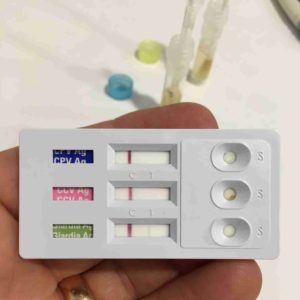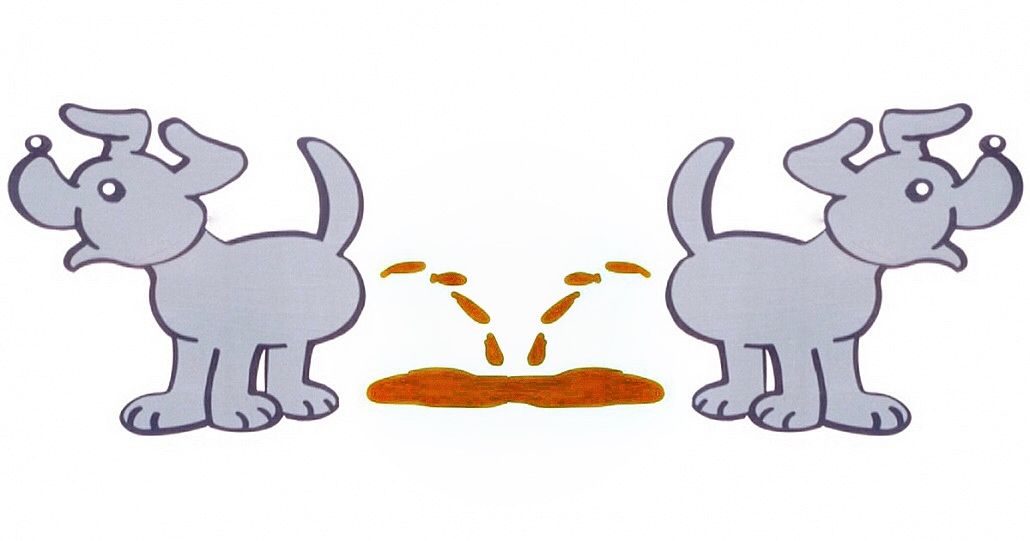Updated June 6, 2021
‘At A Glance (Details Below)’ Emergency Care
When To See The Vet For Diarrhoea
It’s especially important to see a vet straight away for:
- Puppies, old dogs or those without up-to-date vaccination
- Vomiting, not eating or other signs of illness
- Blood in the stool, excessive diarrhoea or possible poisoning
- Dry, tacky gums or any other sign of dehydration
Now dive deeper…
90% of the diarrhoea we see in dogs has only one cause: eating the wrong thing. Sometimes it’s after eating something that’s off, other times it’s just too much of something new. That’s the subject of this article.
For this to be true, your dog needs to appear completely normal in every other way: no lethargy, no loss of appetite. Please see a vet straight away if there are any other signs of illness.
If you’re not sure of the cause, visit this page for all the common causes of diarrhoea in dogs.
What To Give A Dog For Simple Diarrhoea
For uncomplicated dietary diarrhoea, it’s reasonable to attempt home treatment for the first 24 hours.
The best diet for a healthy dog with mild diarrhoea is a bland meal such as minced chicken breast boiled with an equal weight of white rice. Skim off any fat that rises to the top and allow to cool.
Feed smaller than normal meal sizes and see your vet if diarrhoea persists beyond 24 hours. Please do not give any medications such as Imodium® or bismuth (e.g. Pepto Bismol®) without veterinary advice. These drugs only mask the illness, and may actually cause harm.
Sometimes the worst thing about simple diarrhoea in healthy dogs isn’t the effect on the dog. It’s the tremendous, disgusting mess it causes. You are always welcome to let us take your dog for a few days until it passes. We don’t charge too much for hospitalisation and it’s something we’re only too happy to deal with. Just another day at the office!
Vet Treatment Of Diarrhoea
If there has been no improvement in 24 hours, or there are any other signs of illness, it’s time to visit the vet. Of course, you can go straight away without waiting if you prefer.
Here at Walkerville Vet, we no longer use antibiotics for routine, uncomplicated diarrhoea. Here’s what our new protocol looks like:
Dog Diarrhoea Treatment Plan

- Full physical to check for dehydration or signs of systemic illness. These dogs will be admitted to hospital.
- Testing for serious causes of diarrhoea such as parvovirus, coronavirus, Giardia & other parasites, with treatment as necessary.
- Dogs with a fever, or blood in the stool or puppies or seniors are often prescribed antibiotics.
- Happy dogs with ‘normal’ diarrhoea, loose stool or mucus will be given a chance to get better with other treatments first. These include prebiotics, probiotics, binders, bland diet and antiemetics.
- If there’s no improvement, antibiotics may be given as a last resort.
Despite the fact that most dog diarrhoea can be effectively treated without antibiotics, many dogs still get given a course. Back in 2017, we committed to reducing our use of them, and the results have been just as good as before.
So why do so many dogs still get metronidazole for acute diarrhoea?
Why Dogs Get Antibiotics For Diarrhoea
- It’s effective. It’s quite clear to vets that metronidazole is rapidly effective at stopping the most common sort of diarrhoea.
- We know what it’s like. Anyone who’s had a dog with diarrhoea knows what a mess it causes, and we don’t want you to have one more minute of it than you have to.
- People expect it. We’ve been doing this for quite a while and many dog owners have become quite used to receiving antibiotics.
- We can’t be sure. Sometimes, antibiotics are indeed necessary.
Have we been doing the wrong thing by giving your dog metronidazole? The answer may be yes.
What’s Wrong With Using Antibiotics?
- The dose we use to fix simple diarrhoea could make more troublesome bugs resistant. That means worse diarrhoea like that caused by Giardia may become harder to treat, and even become a problem for humans.
- The normal bacterial population, called the microbiome, is profoundly affected by antibiotics and may take several months to recover. This could cause problems such as susceptibility to future infections.
- We could cause adverse effects from using unnecessary drugs.
We thank you for putting your trust in us. We can promise you that we have only your dog’s best interests at heart. Just sometimes, that doesn’t mean doing the easiest thing.
Related: Causes of Diarrhoea in Dogs | Are We Over-Using Antibiotics In Cats?
Have something to add? Comments (if open) will appear within 24 hours.
By Andrew Spanner BVSc(Hons) MVetStud, a vet in Adelaide, Australia. Meet his team here. The information provided here is not intended to be used as a substitute for going to the vet. If your pet is unwell, please seek veterinary attention.


Thanks for this valuable info.
As we’re in Tassie we can’t easily get to visit you but would welcome the opportunity to seek your advice about our dog’s problem.
He’s a 9 year old Boxer who has been suffering with very loose bowel motions for several months now.
He originally lost appetite and weight and exhibited loose and nasty motions at this time. Bloods revealed a loss of protein. Scan was inconclusive , but led to exploratory surgery which showed nothing. antribiotics including metroniazole over 8 weeks finally got rid of an infection, but seem to have locked us into loose bowel motions forever.
He gets half a macrolone tab each morning and this keeps his appetite up. We also give a daily dose of Protexin
We’re using Hills i/d diet (a can of wet and 3 cups of dry daily),but the looseness continues.
We’ve tried chicken and rice to no effect and also Hills z/d and another special food.
Nothing works.
The dog is happy and willing to play at any time.
His coat is good and general health also.
His original weight loss has been reversed and he’s a healthy 32.9kg
He controls his motions but they are very loose emerging in a liquid stream.
Motions are normal colour and there’s no mucus.
Any thoughts you might have would be gratefully received
Peter Hart
Hi Peter. It sounds like you’ve done everything right and the problem is not responding. The best advice I can offer is to seek a referral. I am unsure is a canine internal medicine specialist is available in Tasmania, however. Let me know how you get on.
Try ZiwiPeak airdried dog food.
Expensive, tho’